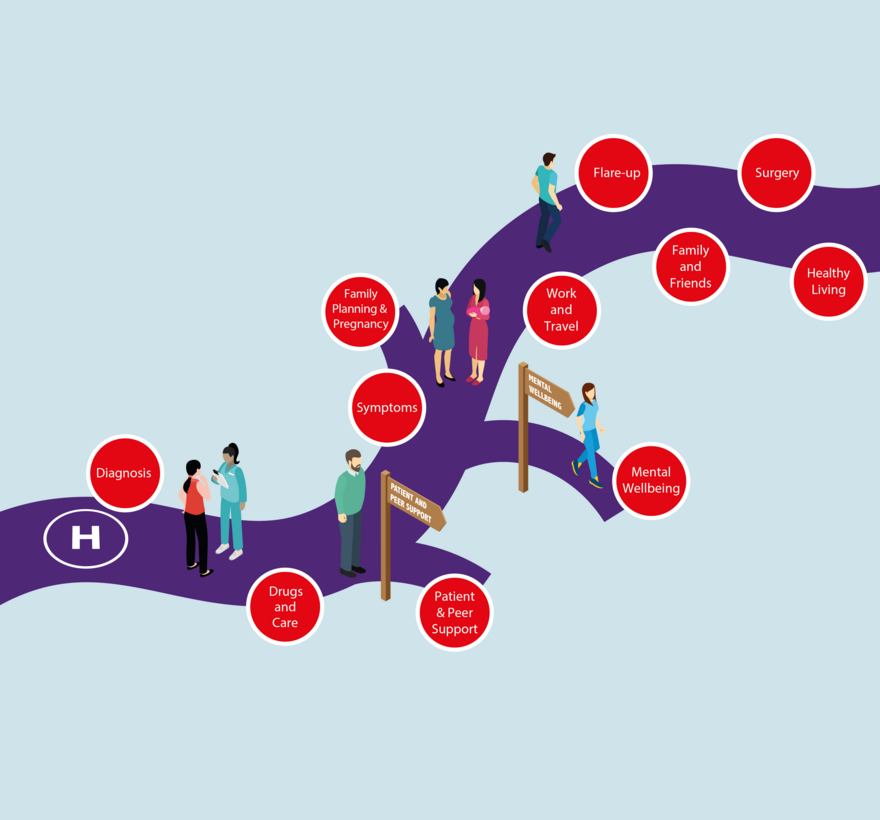
Strategic co-production
The PPIJ is a validated process of insight work with patients to identify information gaps and recommend and co-produce improvements. The process can be used in any therapy area.
The PPIJ uses a 7-step process to embed high-quality patient information along care pathways, helping people get the right information at the right time
7-steps to improving the quality of patient information
The process was piloted with the Inflammatory Bowel Disease Service at St Mark’s Hospital, North London, and at Hereford County Hospital.
- Get the leadership team on board to clarify roles
- Find out what patients think
- Find out what your staff think
- Map the current patient information journey and identify gaps
- Identify and make improvements
- Evaluate the impact of changes made
- Benchmark, review and maintain patient involvement in implementation of change.
PIF has since delivered PPIJ projects for a range of different organisations, working in partnerships with the NHS, patient support groups and, in some cases, industry partners.
PPIJ projects
Sussex ICS – Maternity information for women from black and minority ethnic communities
Black and Asian women experience worse maternal outcomes than white women. This project aims to tackle health inequality by co-producing information with local community groups.
We ran three co-production workshops in community settings which included migrant women and those from settled local communities. One workshop was run in Arabic with community and professional interpreters.
A final workshop brought together community leaders, community midwives and the representatives from the local maternity voices partnerships to identify topics for easy read and translated video information. Maternity charity, Tommy’s, is a partner in the project which will signpost its PIF TICK accredited information and support for Black and ethnic minority women. New health information is now being co-produced to signpost local services.
Scleroderma and Raynaud’s UK – Information for people with the rare condition scleroderma
The process was used to gather insight from people living with scleroderma and healthcare professionals. We used a range of techniques including virtual focus groups and interviews. These identified priority areas of need for SRUK to co-create new information. These were then developed and reviewed in a series of virtual focus groups with patients and healthcare professionals.
Nottingham and Nottinghamshire ICS – Shared Decision Making project in partnership with the Patients Association
The process was used to map the information journey across the complex MSK care pathway. We then co-created resources for shared decision making. We worked with the My Life Choices panel of people with lived experience and health professionals to develop resources through a series of virtual co-production events. See our joint report on the project here
Digital Notts – Inclusive information on long term conditions for the NHS App
A series of PPIJ workshops and interviews were held to review and redraft digital care plans for long term conditions in the NHS app. The project had an emphasis on health literacy and worked with seldom heard groups including the elderly, migrant communities and carers. The project also worked to identify barriers to digital inclusion.
Virtual consultations in cancer care
We were commissioned by Flow Consulting to investigate the information and communication needs of people receiving cancer care during the pandemic. Communication skills training for oncology nurses and top tips for good virtual consultations were developed as a result of the insight gathered during interviews with a diverse group of people with cancer.
St Mark’s hospital – co-creating information resources and evaluating impact
The final part of our pilot at St Mark’s hospital continued our partnership with the IBD team, Crohn’s and Colitis UK and people living with IBD.
The impact of a new diagnosis clinic, flare card and digital signpost to Crohn’s and Colitis UK resources were evaluated using a range of techniques including patient activation measures (PAM). Improvements in PAM were seen in patients on the new diagnosis pathway.
Putting PPIJ into practice in other therapy areas
PIF understands the time constraints facing NHS teams. The PPIJ process is designed to require minimum input from clinical staff. PPIJ provides an opportunity for the NHS, national patient support groups and industry to work in partnership.
In some instances industry provides financial support to cover PIF’s time for a disease-specific pilot within an NHS service. The Perfect Patient Information Journey is tailored to the needs of each service.
PIF also provides expert consultancy on individual steps in the PPIJ process
How we tested the PPIJ
PIF has published three reports on the PPIJ. The first looked at patients' perceptions of a PPIJ, and the second describes the practical process piloted at St Mark's and Hereford Hospital. The third focuses on evaluating the impact of the information improvements made at St Mark’s. The reports are available here
Further information
For more information on PPIJ services contact info@pifonline.org.uk.



